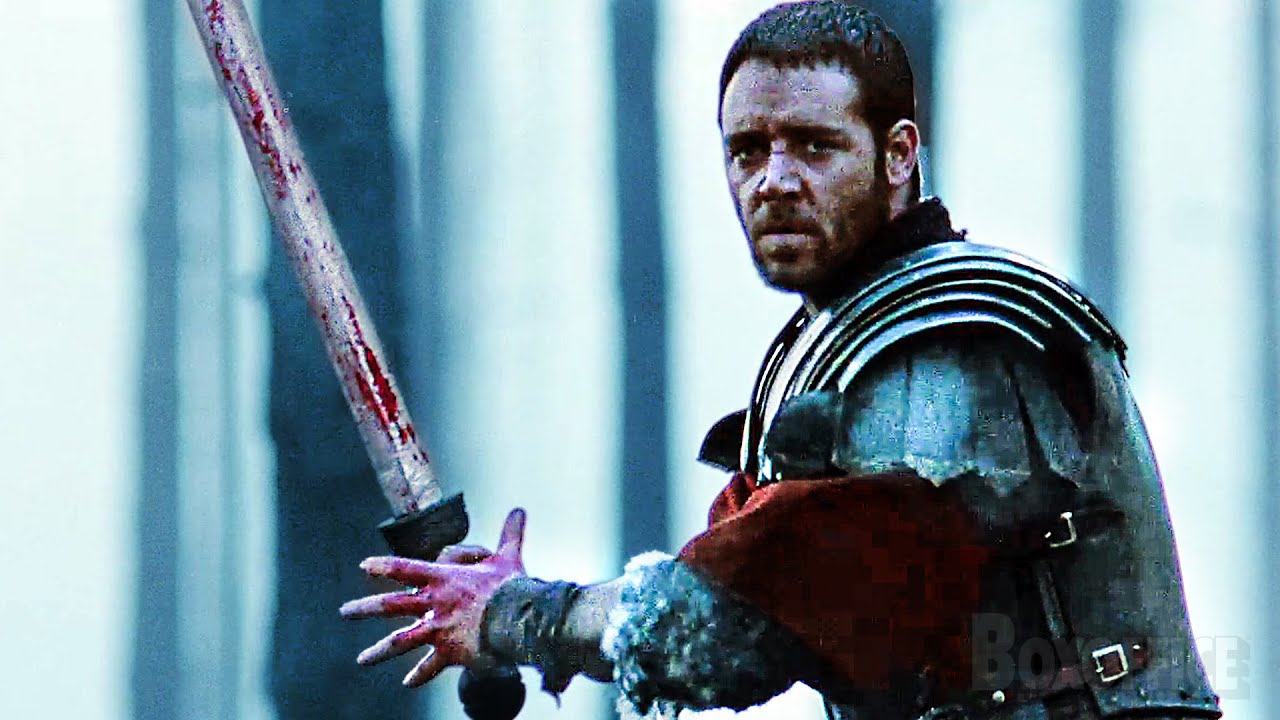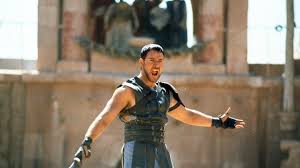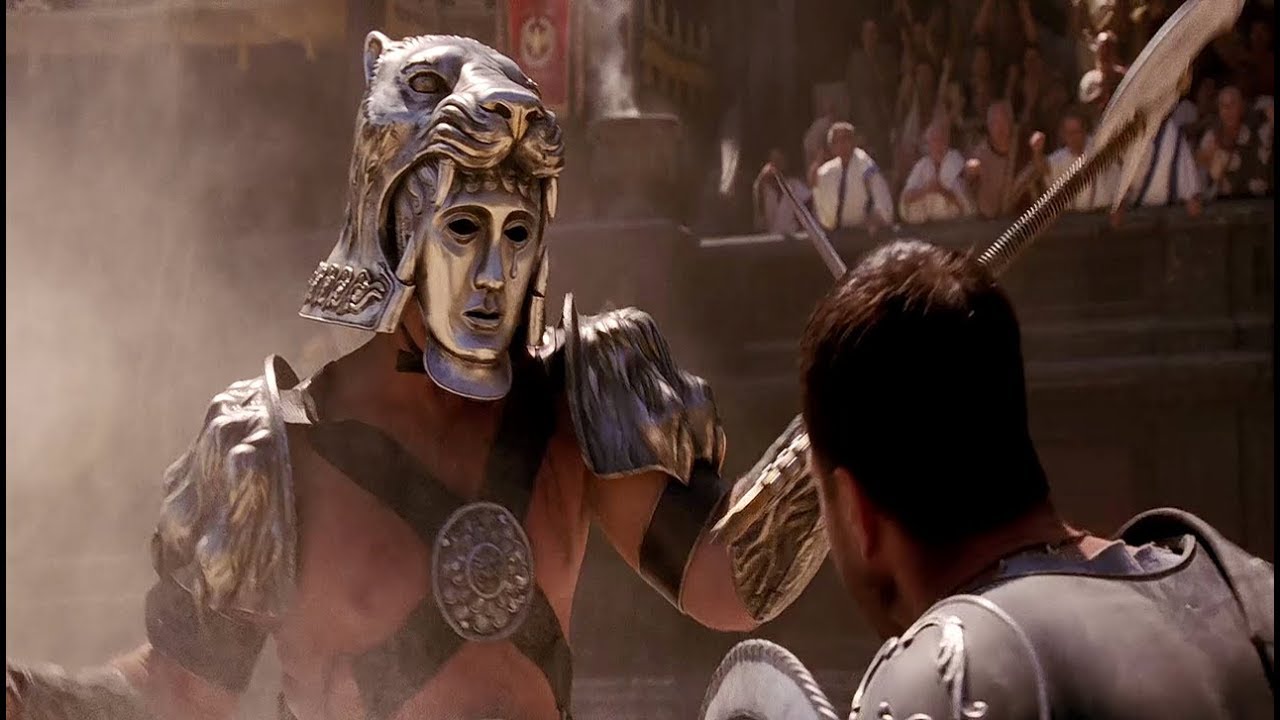🎬 Gladiator (2000)

Review of Gladiator (2000)
Ridley Scott’s Gladiator (2000) is a cinematic masterpiece that seamlessly blends epic storytelling, breathtaking visuals, and powerful performances. This historical drama set in ancient Rome captivated audiences upon its release, revitalizing the sword-and-sandal genre and earning critical acclaim. With its gripping narrative, iconic characters, and unforgettable score, Gladiator remains a landmark in modern filmmaking.
A Tale of Revenge and Redemption
At the heart of Gladiator is the story of Maximus Decimus Meridius (Russell Crowe), a respected Roman general who is betrayed by Commodus (Joaquin Phoenix), the ambitious and treacherous son of Emperor Marcus Aurelius (Richard Harris). Stripped of his rank, enslaved, and forced to become a gladiator, Maximus embarks on a quest for vengeance against Commodus while seeking to honor his slain family.
The narrative is a compelling blend of personal and political drama, exploring themes of loyalty, power, and the human spirit. Maximus’s journey from a noble general to a gladiatorial hero underscores the resilience of the human spirit and the pursuit of justice, even in the face of overwhelming adversity.
Russell Crowe’s Iconic Performance
Russell Crowe’s portrayal of Maximus is both commanding and deeply emotional, earning him the Academy Award for Best Actor. Crowe imbues the character with a sense of stoic determination and vulnerability, making Maximus a relatable and enduring hero. His physical presence and nuanced performance anchor the film, particularly in moments of quiet reflection and explosive action.
Joaquin Phoenix delivers a chilling performance as Commodus, capturing the character’s insecurity, cruelty, and hunger for power. His portrayal of the morally corrupt emperor serves as a perfect foil to Maximus, creating a compelling dynamic between hero and villain. Phoenix’s ability to evoke both contempt and pity for Commodus adds depth to the character, making him one of cinema’s most memorable antagonists.
A Visual and Emotional Epic
Ridley Scott’s direction is nothing short of visionary. The film’s sweeping cinematography, helmed by John Mathieson, captures the grandeur of ancient Rome, from the dusty arenas of the gladiatorial games to the majestic architecture of the Colosseum. The production design and costumes are meticulously crafted, immersing viewers in the world of ancient Rome with stunning authenticity.
The gladiatorial combat sequences are masterfully choreographed, blending brutal action with emotional stakes. These scenes are as thrilling as they are harrowing, showcasing the visceral reality of the arena while highlighting Maximus’s resourcefulness and resilience. Scott’s use of slow motion, dynamic camera angles, and practical effects enhances the intensity and impact of these moments.
Hans Zimmer’s Iconic Score
Hans Zimmer’s score for Gladiator is a key component of the film’s emotional resonance and cultural legacy. The haunting melodies and powerful orchestral arrangements, particularly the iconic “Now We Are Free,” elevate the narrative and provide a sense of epic grandeur. Zimmer’s music captures the film’s emotional core, enhancing both its intimate moments and its sweeping battles.
Themes of Honor and Legacy
Gladiator delves into timeless themes of honor, legacy, and the quest for freedom. Maximus’s unwavering commitment to his principles and his desire to honor his family’s memory serve as the driving forces of the narrative. The film also explores the corrupting influence of power, as embodied by Commodus, and the tension between personal ambition and the greater good.
The concept of legacy is central to the story, with Maximus’s actions inspiring those around him and challenging the oppressive status quo. His journey resonates on a universal level, reminding viewers of the enduring impact of courage, sacrifice, and integrity.
Critical and Commercial Success
Gladiator was a box office triumph, grossing over $460 million worldwide, and received widespread critical acclaim. The film won five Academy Awards, including Best Picture and Best Actor for Russell Crowe, and was nominated for an additional seven. Its success revitalized interest in historical epics, influencing a wave of similarly ambitious films in the years that followed.
Beyond its accolades, Gladiator has left an indelible mark on popular culture. Lines like “Are you not entertained?” and “What we do in life echoes in eternity” have become iconic, cementing the film’s place in cinematic history.
Conclusion
Gladiator is more than just a film; it is an experience that combines thrilling action, emotional depth, and timeless themes. Ridley Scott’s masterful direction, Russell Crowe’s unforgettable performance, and Hans Zimmer’s stirring score come together to create a cinematic epic that continues to captivate audiences more than two decades after its release. Whether you’re a fan of historical dramas or simply seeking a powerful story of resilience and redemption, Gladiator is a must-watch that stands the test of time.